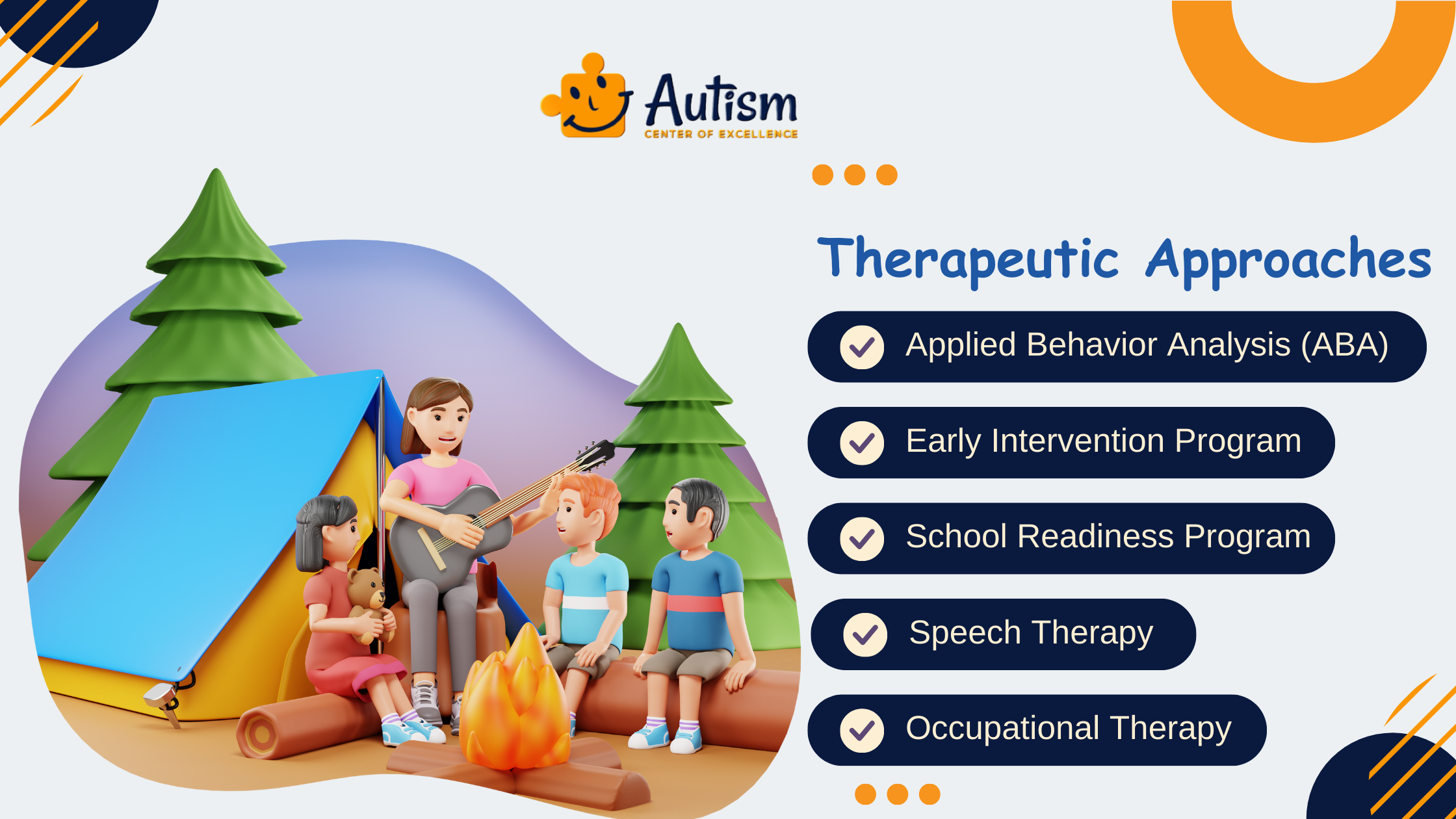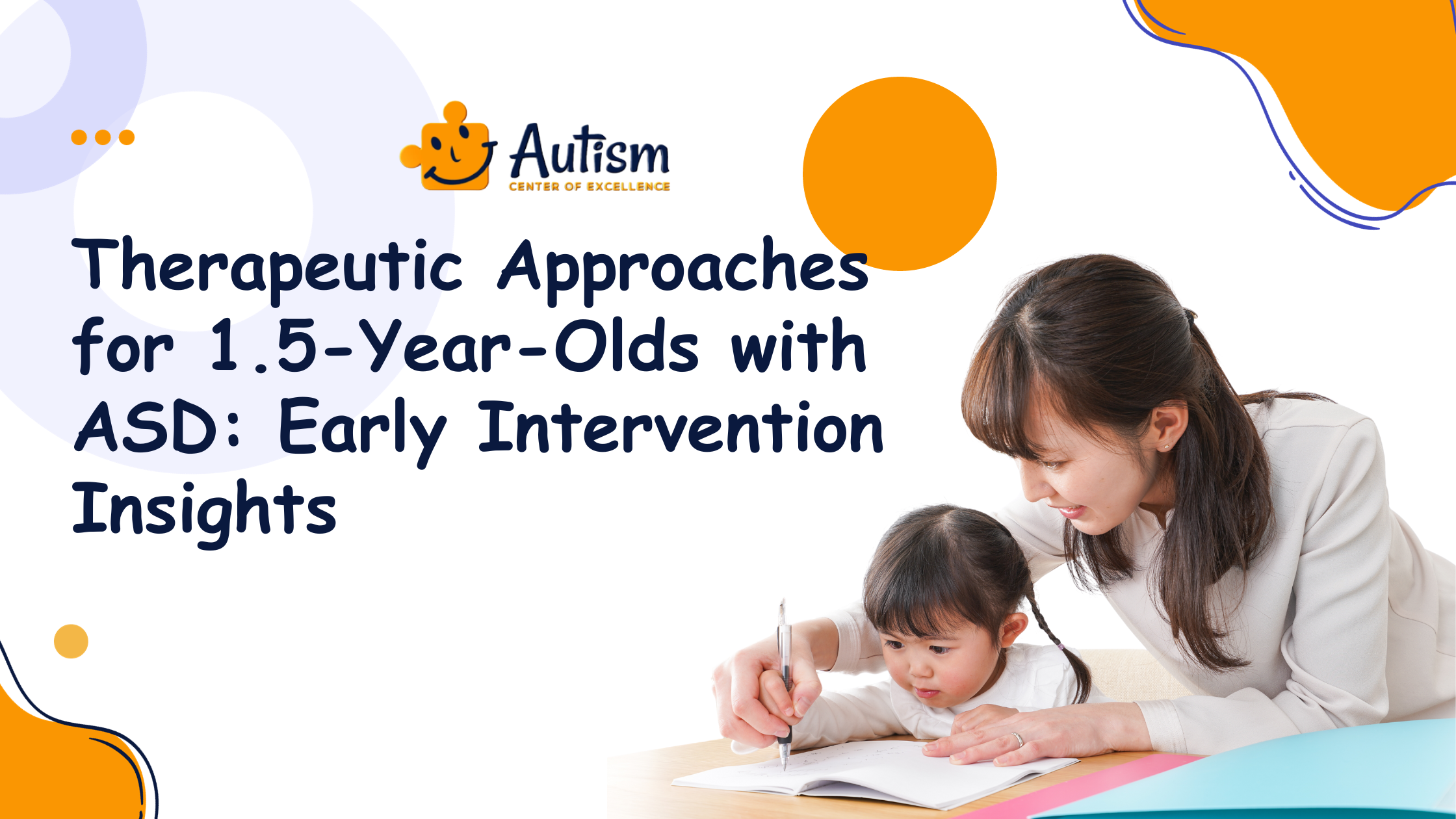Early intervention is a primary consideration for 1-1/2-year-old children with Autism Spectrum Disorders. Therapeutic approaches like behavioral, cognitive, and communication therapy will be utilized as a method of intervention for social, cognitive and communicative skills. Observing the process of mother-infant psychoanalytic treatment, which implies the intrauterine relationships between the mother and her child, decreases communication problems and helps in socializing these individuals. Language therapy is another option that significantly assists the kids in better processing the language of communication.
Early Intervention gives the utmost attention to the social timing phenomenon which is best highlighted by videos which then the social interactions of children with ASD are studied intensively. An attempt at picky eating is the thing with ASD. However, this kind of behavior can be eliminated with the family-centered approach. Besides, the gender-associated study of autism spectrum disorder can be supportive as the female students with ASD could have different experiences as well as needs compared to the male ones.
AutismCOE is one of the leading organizations that offers individual care for children with autism spectrum disorder. The beginning activities in toddlers with ASD should start right after the diagnosis and the timely implementation of the therapeutic approaches which will have a great impact on the toddlers’ developmental milestones. Here, we will talk about the relevance of early intervention for 1.5-year-olds with ASD, along with valuable arguments that point to the advantages of initiating therapies at this age.
Understanding 1.5-Year-Olds with ASD
The toddler period is when an exceptional number of developmental milestones surface. Hence, they are regarded as an important indicator of a child’s physical, mental, and emotional growth and learning. For example, toddlers who are 1.5 years old can have the ability to engage in more elaborate play and understand simple instructions. She also shows more independence. But these skills might be different or even delayed at the same time if the child has autism.
As for the signs of typical ASD-related features in toddlers, there can be non-existent eye contact, gaps in social connections, and repeating behaviors and communication can also become a problem. Identification of these indicators is the most important phase in getting the proper support for your child.
Autism Spectrum Disorder (ASD) can manifest itself in different ways through many of the visible symptoms that may be noticed during the time frame of 1.5 years. While every child is unique, here are some early indicators of ASD in toddlers that parents and caregivers should be aware of:
Repetitive Behaviors
ASD affected children most of time show tendencies to repetitive behaviors. These may include things such as humming, spinning or repetitive motions.
Delayed Speech or Non-Verbal Communication
Language capture with ASD is the common sign that can show differences in social language development. Toddlers could show different milestones of linguistic and social skills.
Difficulties with Social Interaction
Communication issues may arise in ASD children that result in impairment of his or her interpersonal relationships with peers. Problems like dominating a conversation with their favorite topic and not being able to know that it is time for others to speak can be an issue.
Limited Interests
Kids with autism spectrum disorders commonly become very limited, rude, and even obsessive in their behavior, activities, and interest patterns.
Reduced Eye Contact
One of the characteristics of ASD among young kids is having problems with maintaining sustained eye contact. You may probably find it difficult to achieve eye contact with your baby while he/she is sitting upright and is often distracted by all the amazing sights around.
The goal is to know these warning indicators in advance in order to achieve timely treatment. Therapeutic approaches can be employed at home where they are integrated as routine behaviors that help the child to enhance his/her development. Keep in mind, that every child is an individual, and not everything in this list can be present in your case or some signs not listed may arise. If you as a parent note any issues with your child’s development, giving them a proficient examination is an absolute must.
The Importance of Early Intervention
An Early Intervention refers to various services and supports that are offered in order to solve developmental delays in children who are so young. In the case of ASD, early intervention will have a far-reaching effect in securing the child’s development, and learning and giving them a better life. Being able to use the knowledge of their own personality traits and special needs, such interventions help to improve their social and communication skills.
The sooner these interventions start, the higher the probability that they will be successful. At an early stage, when the brain is at its most malleable during the developmental years, early intervention can translate these years into a remarkable period of growth.
Join Our Weekly Newsletters!
Subscribe now to stay updated with our latest email updates.

Therapeutic Approaches in Early Intervention
The use of different therapeutic interventions has been found useful in treating toddlers that suffer from ASD. The described methods aim at strengthening particular areas of development, they are usually individualized corresponding to the child’s peculiarities and characteristics.
Applied Behavior Analysis (ABA)
ABA therapeutic approach utilizes positive reinforcement to encourage behaviors that are beneficial while decreasing those that may be harmful or negative. For one-and-a-half years old, this may mean the development of fundamental skills such as attention, imitation, and simple orders.
Early Intervention Program
The early intervention programs are meant to give the needed support and aid to the families and children who are living with autism spectrum disorders. Such programs are able to involve a child in the process of socializing, communicating, as well as learning life skills.
School Readiness Program
The primary purpose of the school readiness programs is to guide children with autism to be ready to attend school. Such academic programs can benefit children considerably, giving them the necessary talents that are important for studying.
Speech Therapy
The intervention is concentrated on the little one’s development of communication abilities. The Speech Therapists can assist a toddler with ASD to develop verbal language or use alternate means of communication.
Occupational Therapy
Through working with Occupational Therapists kids are taught basic skills which are needed for everyday life. For instance, such purposeful things could be hands-on activities which facilitate the development of fine motor skills, sensory processing and personal care.
Practical Strategies and Techniques
Undoubtedly, parenting and caregiving are influential in nurturing a child. Implementing therapeutic approaches into a toddler’s everyday life will not only support learning but also provide guidance to progressive achievements.
Here are some practical strategies that parents can implement at home to reinforce therapeutic strategies:
Consistent Routines
Creation of a typical daily schedule will serve as a safety net to children, making the surroundings familiar for them. This may be particularly helpful for kids with autism and ADHD, as it can help them regain their focus and remain calm.
Encourage Communication
Let them express it either by combining use of speech or sign language or with the help of a communication device. Make use of labeling the objects in your surroundings and sentence-filling exercises to increase the vocab and comprehension.
Motor Skill Activities
Add games and activities that improve fine motor skills, such as art or crafts activities. It could be anything from doing crafts with playdough, threading beads, or even helping us with everyday chores like folding laundry.
Social Interaction
Provide a forum to give your child a chance to be with other children. It could mean going to a friend’s house, joining a kids’ club or taking part in sports outside, or attending community activities.
Sensory Play
Through sensory activities, children will be able to explore their senses and respond purposefully in initial encounters with sensory stimulation. These activities may be as simple as arranging sand and water boxes or using sensory equipment.
Positive Reinforcement
Use positive reinforcement by rewarding good behavior to further learning. This could be saying words of praise, a hug or a reward such as a sticker or extra playtime.
Healthy Lifestyle
A balanced diet and the right amount of exercise along with a good night’s sleep can help children to have a good memory and can substantially affect their mood and behavior.
Model Behavior
At most times, the child learns by imitating others. Being an example: Try to model the behavior you want your child to learn. This may demostrate successfully how to manage agitation, how to share, or how to state their observations clearly.
The fact is, any given kid has their own caliber and what underscores one may not work for the other. It is essential to keep changing with your child, being able to adapt, and listening to his/her demands.
Professional Guidance and Resources
Mothers or grandparents are often the primary teachers for these children apart from all this, therapists and specialists have an essential function in early education. They will be able to create personalized therapy programs, track the outcomes, and provide good counseling to the clients.
In addition, you can explore the Autism Speaks, the Autism Society, and the National Autism Center for comprehensive reading materials. These nonprofit groups will review many materials about ASD, early intervention strategies and support to families, among other important topics.
Frequently Asked Questions & Answer
How Does Early Intervention Benefit 1.5-Year-Olds with ASD?
This have an extremely positive effect on a child’s growth. It can extend cognitive capacity, enable the development of language skills, and enrich the social connectedness. The sooner a child starts therapy the better positive long-term outcome will be.
How Early Should Therapeutic Intervention Start for A Child Diagnosed with ASD?
The most beneficial time to start therapeutic intervention is to begin immediately as soon as a diagnosis of ASD is established. Diagnosis and intervention at an early stage, frequently before 3 years old, have a significant impact on the results, as they become better.
Are There Specific Therapies Tailored for 1.5-Year-Olds with ASD?
Sure, therapies, in most cases, address the situation molding the child, their stage of development, and particular needs, respectively. For instance, in the case of 1.5-year-olds, it can be therapy centered on play, helping the child with speech, social and motor skills that should be improved.
How Can Parents Support Their 1.5-Year-Old Child with ASD During Early Intervention Therapies?
Parents can encourage and assist their kids in a therapy session wherein they will learn critical skills. They can also build a supportive and structured environment at home. Besides, parents need to have self-care approaches and whenever appropriate, parents need to get support.
Conclusion
Although it may be difficult at times, you must also always keep in mind that each small step your kid takes represents a great achievement. Through seeking counseling, dealing with a variety of approaches and never failing to investigate resources that will help your kiddo cope, you will be able to provide the child with the best support possible. At AutismCOE, the unlimited possibility of every single child with Autism Spectrum Disorder is at the center of our work. Hence, feel free to communicate with us in every difficulty you face. Together we will celebrate your 1.5 -old child’s progress and achievements through ASD!
Please Note: The content of this blog is for informational purposes only and should not be considered a substitute for professional medical advice, diagnosis, or treatment. Consult a qualified healthcare professional for personalized guidance tailored to your specific situation.

Bhavika Bhasin
Bhavika Bhasin is the Research and Marketing officer at AutismCOE. She works with children and adults with ASD. Her clinical research includes evaluating various available autism screening and diagnosis methods and their efficacy. She is currently developing a novel screening exam that is indicated to be more accurate than the existing available exams. She is also writes articles papers for various publications.


